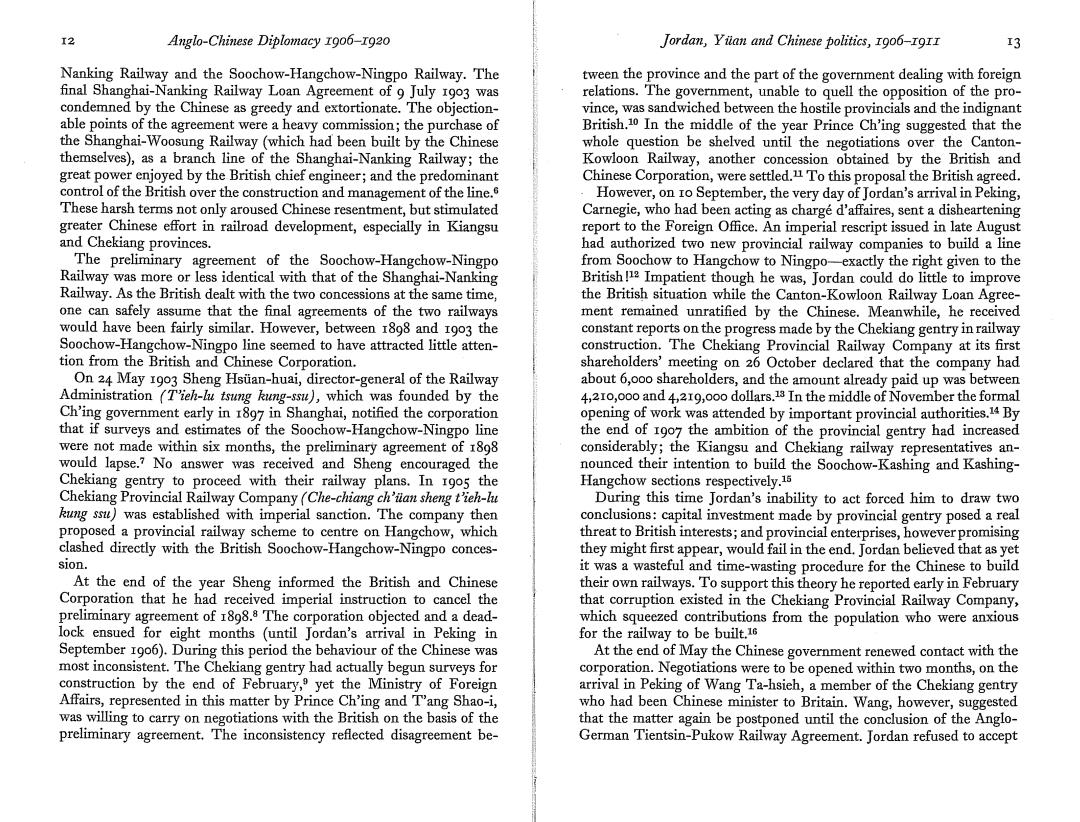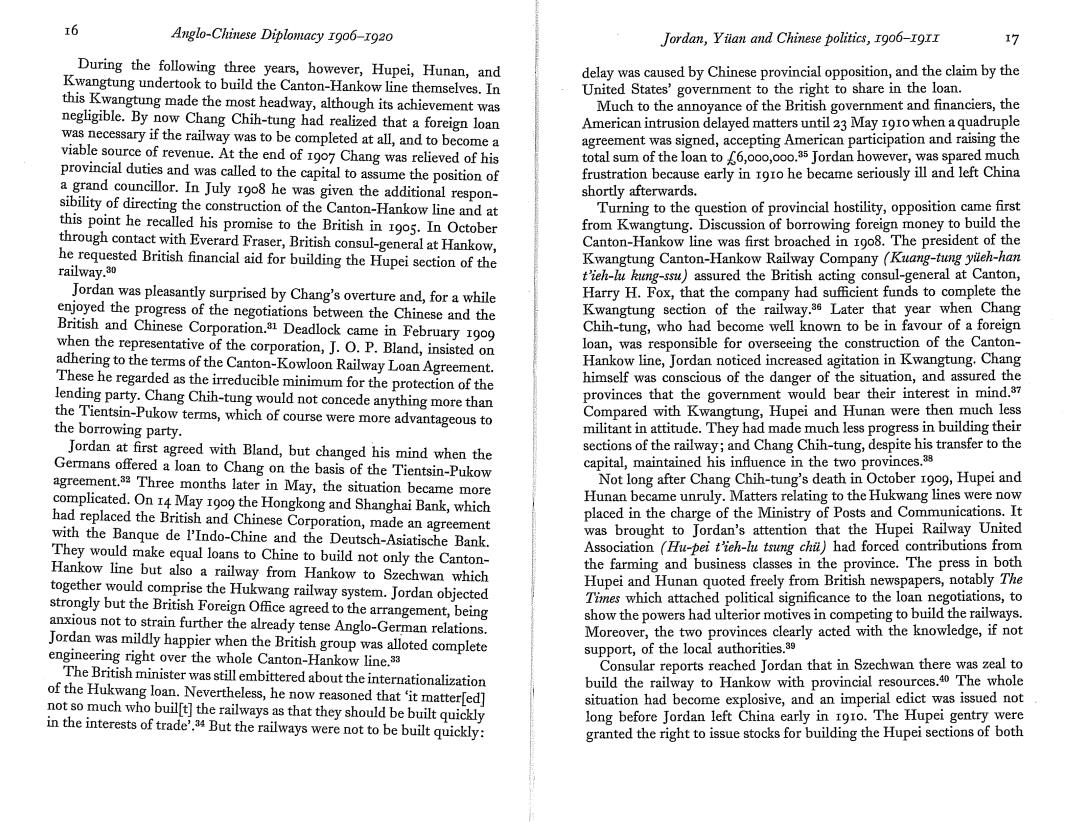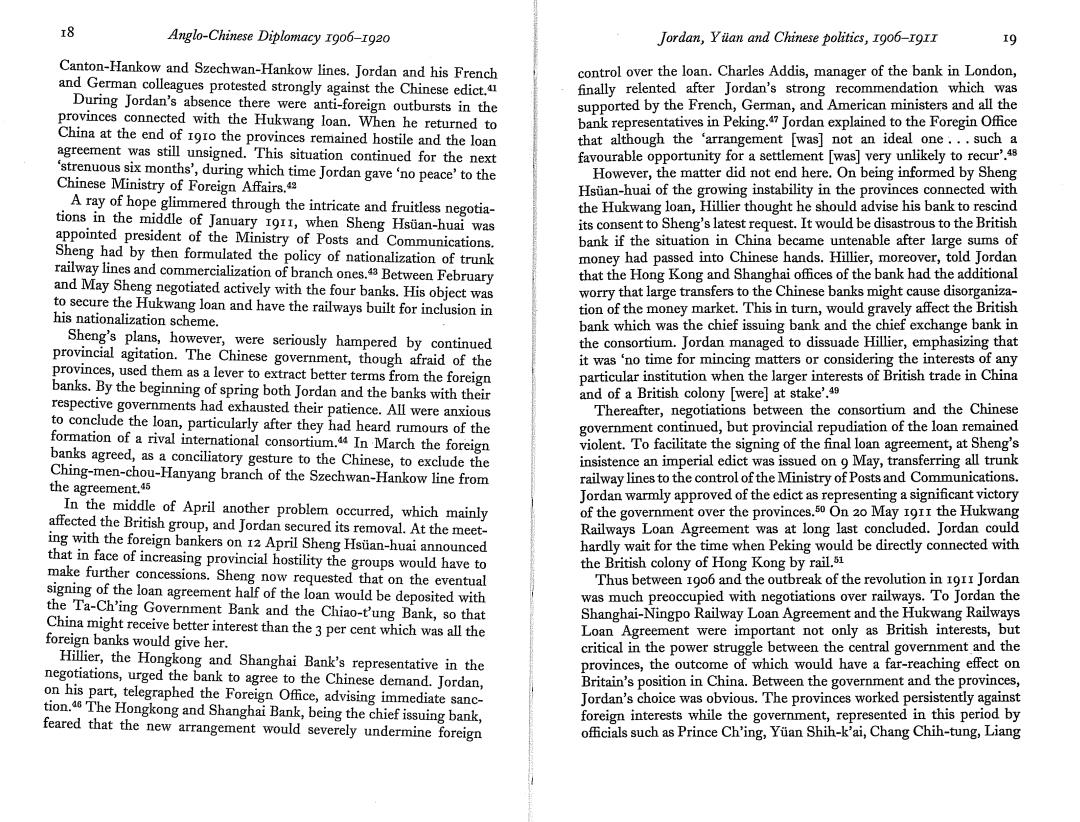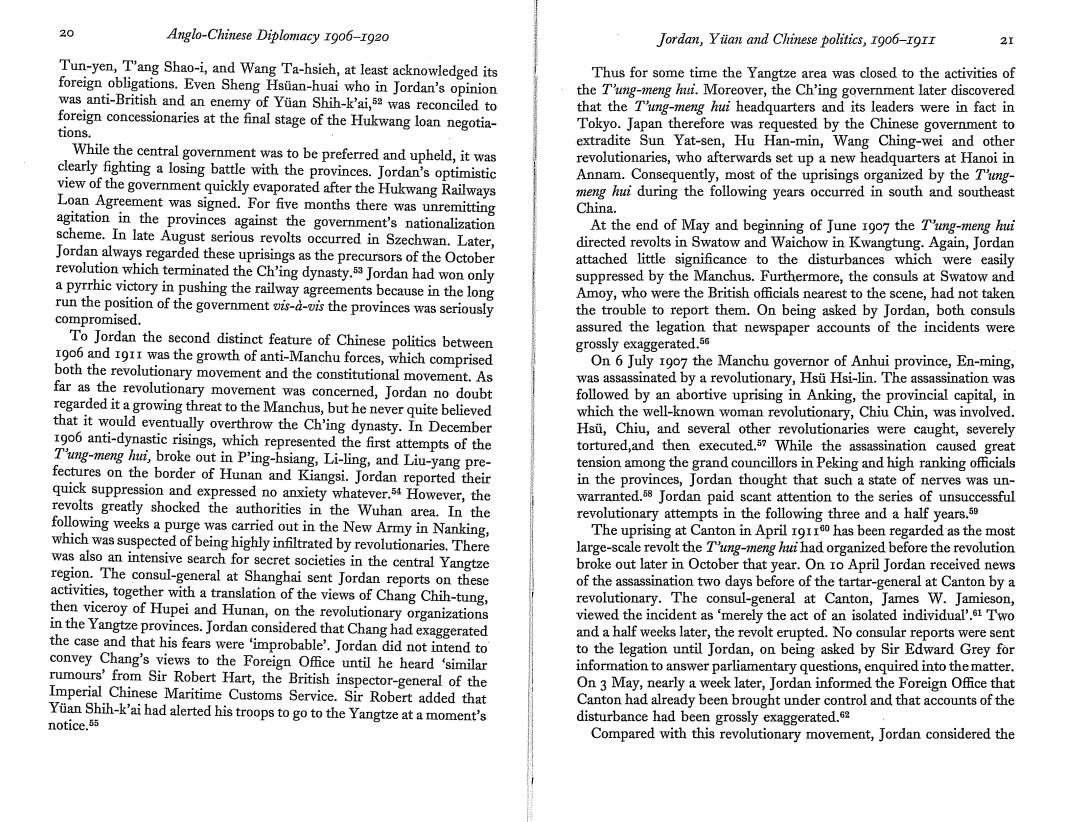
I2 Anglo-Chinese Diplomacy 1906-1920 Jordan,Yiian and Chinese politics,1906-I9II 3 Nanking Railway and the Soochow-Hangchow-Ningpo Railway.The tween the province and the part of the government dealing with foreign final Shanghai-Nanking Railway Loan Agreement of 9 July Igo3 was relations.The government,unable to quell the opposition of the pro- condemned by the Chinese as greedy and extortionate.The objection- vince,was sandwiched between the hostile provincials and the indignant able points of the agreement were a heavy commission;the purchase of British.10 In the middle of the year Prince Ch'ing suggested that the the Shanghai-Woosung Railway(which had been built by the Chinese whole question be shelved until the negotiations over the Canton- themselves),as a branch line of the Shanghai-Nanking Railway;the Kowloon Railway,another concession obtained by the British and great power enjoyed by the British chief engineer;and the predominant Chinese Corporation,were settled.1 To this proposal the British agreed. control of the British over the construction and management of the line.6 However,on Io September,the very day of Jordan's arrival in Peking, These harsh terms not only aroused Chinese resentment,but stimulated Carnegie,who had been acting as charge d'affaires,sent a disheartening greater Chinese effort in railroad development,especially in Kiangsu report to the Foreign Office.An imperial rescript issued in late August and Chekiang provinces. had authorized two new provincial railway companies to build a line The preliminary agreement of the Soochow-Hangchow-Ningpo from Soochow to Hangchow to Ningpo-exactly the right given to the Railway was more or less identical with that of the Shanghai-Nanking British!1 Impatient though he was,Jordan could do little to improve Railway.As the British dealt with the two concessions at the same time, the British situation while the Canton-Kowloon Railway Loan Agree- one can safely assume that the final agreements of the two railways ment remained unratified by the Chinese.Meanwhile,he received would have been fairly similar.However,between 1898 and Igo3 the constant reports on the progress made by the Chekiang gentry in railway Soochow-Hangchow-Ningpo line seemed to have attracted little atten- construction.The Chekiang Provincial Railway Company at its first tion from the British and Chinese Corporation. shareholders'meeting on 26 October declared that the company had On 24 May I9o3 Sheng Hstan-huai,director-general of the Railway about 6,oo0 shareholders,and the amount already paid up was between Administration (Tieh-lu tsung kung-ssu),which was founded by the 4,210,ooo and 4,219,ooo dollars.13 In the middle of November the formal Ch'ing government early in 1897 in Shanghai,notified the corporation opening of work was attended by important provincial authorities.14 By that if surveys and estimates of the Soochow-Hangchow-Ningpo line the end of 19o7 the ambition of the provincial gentry had increased were not made within six months,the preliminary agreement of 1898 considerably;the Kiangsu and Chekiang railway representatives an- would lapse.?No answer was received and Sheng encouraged the nounced their intention to build the Soochow-Kashing and Kashing- Chekiang gentry to proceed with their railway plans.In 19o5 the Hangchow sections respectively.15 Chekiang Provincial Railway Company (Che-chiang ch'tan sheng t'ieh-l During this time Jordan's inability to act forced him to draw two kung ssu)was established with imperial sanction.The company then conclusions:capital investment made by provincial gentry posed a real proposed a provincial railway scheme to centre on Hangchow,which threat to British interests;and provincial enterprises,however promising clashed directly with the British Soochow-Hangchow-Ningpo conces- they might first appear,would fail in the end.Jordan believed that as yet sion. it was a wasteful and time-wasting procedure for the Chinese to build At the end of the year Sheng informed the British and Chinese their own railways.To support this theory he reported early in February Corporation that he had received imperial instruction to cancel the that corruption existed in the Chekiang Provincial Railway Company, preliminary agreement of 1898.8 The corporation objected and a dead- which squeezed contributions from the population who were anxious lock ensued for eight months (until Jordan's arrival in Peking in for the railway to be built.16 September 1go6).During this period the behaviour of the Chinese was At the end of May the Chinese government renewed contact with the most inconsistent.The Chekiang gentry had actually begun surveys for corporation.Negotiations were to be opened within two months,on the construction by the end of February,9 yet the Ministry of Foreign arrival in Peking of Wang Ta-hsieh,a member of the Chekiang gentry Affairs,represented in this matter by Prince Ch'ing and T'ang Shao-i, who had been Chinese minister to Britain.Wang,however,suggested was willing to carry on negotiations with the British on the basis of the that the matter again be postponed until the conclusion of the Anglo- preliminary agreement.The inconsistency reflected disagreement be- German Tientsin-Pukow Railway Agreement.Jordan refused to accept

14 Anglo-Chinese Diplomacy 1go6-1920 Jordan,Yiian and Chinese politics,Igo6-IgII 15 this proposal.He did not agree that the Soochow-Hangchow-Ningpo sea....The provincials are bombarding the Wai Wu Pu with furious line,a British interest,should be secondary to the Tientsin-Pukow line telegrams threatening open rebellion if they yield,while we go down which was only half a British interest. once a week and tell them that they have no claim to be considered a Negotiations finally resumed early in August.At the second meeting government if they cannot bring the provincials into line.There has the Chinese gave Guy Hillier,the representative of the corporation, never before been such a distinct test case between Peking and the three choices.The first two basically nullified the preliminary agree- provinces,and the result,whatever way it goes,must have far-reaching ment;the third provided that 'the corporation should furnish a loan for effects'.22 the construction of the whole line by China herself,the loan being Despite what he felt,Jordan was forced to compromise regarding the secured by Chinese Government revenues other than those of the precedence of the Soochow-Hangchow-Ningpo line over the Tientsin- railway,but repayable out of the surplus earnings of the line'.17 In short, Pukow line.The Chinese government argued that the publication of the the Chinese offered a compromise in which the corporation could lenient terms of the latter would expedite further negotiations,especially provide the loan but have no part in building and operating the railway. when it was made known that the two agreements were to be identical.23 Jordan,taking into account the hostile attitude of the provinces, Provincial vehemence began to subside early in Igo8,partly due to reluctantly advised Hillier to accept the Chinese offer.18 However,the the laxity of the Tientsin-Pukow Railway Agreement.More important British minister refused the Chinese request that the British loan be however,was the central government's concession that the Soochow- used for another project,arguing that the provinces had accumulated Hangchow-Ningpo loan would be borne not by the provinces but by sufficient capital for building the railway.19 This resulted in the issue of the Ministry of Posts and Communications (Yu ch'uan pu). an imperial edict:the governors of Kiangsu and Chekiang were to The final agreement was signed on 6 March 1go8.Compared with the persuade the gentry to accept the compromise which had been reached Shanghai-Nanking Railway Loan Agreement,the Shanghai(instead of between the government and the corporation. Soochow)-Ningpo Railway Loan Agreement24 represented considerable However,the provinces would not comply with this.Towards the loss of British rights.In the case of default the Shanghai-Ningpo line, end of the year they decided to defy both the central government and unlike the Shanghai-Nanking Railway,could not be mortgaged or taken the British.The gentry bombarded the local and central authorities with over by British creditors.The loan was secured not on the surplus angry telegrams.Tuan-fang,then viceroy at Nanking,received a earnings of the railway itself,but on those of the Imperial Railway of belligerent letter from the provincial railway companies.Mass meetings North China.There would be no British auditor as stipulated in the were held in the provinces;the British loan was denounced as an preliminary agreement.The British chief engineer was to be selected by alienation of the people's rights and anti-British boycotts were discussed. the Ministry of Posts and Communications and was to function under The Chinese press,especially in Shanghai,threatened anti-dynastic Chinese authorities.25 In short,the railway was to be a roo per cent risings and assassinations.Wang Ta-hsieh was said to have been warned Chinese property.26 Jordan considered such reduced privileges 'the best' by his fellow provincials that if he allowed the agreement to be signed, the British could obtain under the circumstances.27 his ancestral tomb would be desecrated.20 The central government Not long afterwards negotiations began for the building of the dared not conclude the settlement with the corporation.Sheng Hstian- Hukwang railway from Hankow (Hupei)to Canton (Kwangtung). huai was called to Peking to act as an intermediary between the govern- Initially the American Chinese Development Company obtained in ment and the provinces.The government even invited provincial April 1898 the right to build a railway from Hankow to Canton.On 6 representatives to Peking for consultation.These representatives,how- September Igo5 the Chinese government redeemed the right from the ever,were determined to block any compromise agreement.21 Americans for US$6,750,o00,28 to which sum the British government While Jordan was fully aware that the Peking government was under in Hong Kong contributed I,roo,ooo in the form of a loan.In return great pressure from the provinces,he nevertheless adopted a most for their assistance the British were assured by Chang Chih-tung,then intransigent attitude which he deemed vital under the circumstances: viceroy of Hupei and Hunan provinces,of priority in railway develop- "The Central Government is now between the Devil and the deep ment in the two Hu provinces.39

16 Anglo-Chinese Diplomacy 19o6-1920 Jordan,Yiian and Chinese politics,19o6-I9II 17 During the following three years,however,Hupei,Hunan,and Kwangtung undertook to build the Canton-Hankow line themselves.In delay was caused by Chinese provincial opposition,and the claim by the United States'government to the right to share in the loan. this Kwangtung made the most headway,although its achievement was Much to the annoyance of the British government and financiers,the negligible.By now Chang Chih-tung had realized that a foreign loan American intrusion delayed matters until 23 May Igro when a quadruple was necessary if the railway was to be completed at all,and to become a viable source of revenue.At the end of 19o7 Chang was relieved of his agreement was signed,accepting American participation and raising the total sum of the loan to 6,000,000.35 Jordan however,was spared much provincial duties and was called to the capital to assume the position of frustration because early in Igro he became seriously ill and left China a grand councillor.In July 1go8 he was given the additional respon- shortly afterwards. sibility of directing the construction of the Canton-Hankow line and at Turning to the question of provincial hostility,opposition came first this point he recalled his promise to the British in Igo5.In October from Kwangtung.Discussion of borrowing foreign money to build the through contact with Everard Fraser,British consul-general at Hankow, Canton-Hankow line was first broached in 19o8.The president of the he requested British financial aid for building the Hupei section of the Kwangtung Canton-Hankow Railway Company (Kuang-tung yieh-han railway.30 t'iek-lu kung-ssu)assured the British acting consul-general at Canton, Jordan was pleasantly surprised by Chang's overture and,for a while Harry H.Fox,that the company had sufficient funds to complete the enjoyed the progress of the negotiations between the Chinese and the Kwangtung section of the railway.36 Later that year when Chang British and Chinese Corporation.31 Deadlock came in February 1gog Chih-tung,who had become well known to be in favour of a foreign when the representative of the corporation,J.O.P.Bland,insisted on loan,was responsible for overseeing the construction of the Canton- adhering to the terms of the Canton-Kowloon Railway Loan Agreement. Hankow line,Jordan noticed increased agitation in Kwangtung.Chang These he regarded as the irreducible minimum for the protection of the himself was conscious of the danger of the situation,and assured the lending party.Chang Chih-tung would not concede anything more than provinces that the government would bear their interest in mind.37 the Tientsin-Pukow terms,which of course were more advantageous to Compared with Kwangtung,Hupei and Hunan were then much less the borrowing party. militant in attitude.They had made much less progress in building their Jordan at first agreed with Bland,but changed his mind when the sections of the railway;and Chang Chih-tung,despite his transfer to the Germans offered a loan to Chang on the basis of the Tientsin-Pukow capital,maintained his influence in the two provinces.38 agreement.32 Three months later in May,the situation became more Not long after Chang Chih-tung's death in October 19og,Hupei and complicated.On 14 May Igog the Hongkong and Shanghai Bank,which Hunan became unruly.Matters relating to the Hukwang lines were now had replaced the British and Chinese Corporation,made an agreement placed in the charge of the Ministry of Posts and Communications.It with the Banque de I'Indo-Chine and the Deutsch-Asiatische Bank. was brought to Jordan's attention that the Hupei Railway United They would make equal loans to Chine to build not only the Canton- Association (Hu-pei t'ieh-lu tsung chi)had forced contributions from Hankow line but also a railway from Hankow to Szechwan which the farming and business classes in the province.The press in both together would comprise the Hukwang railway system.Jordan objected Hupei and Hunan quoted freely from British newspapers,notably The strongly but the British Foreign Office agreed to the arrangement,being Times which attached political significance to the loan negotiations,to anxious not to strain further the already tense Anglo-German relations. show the powers had ulterior motives in competing to build the railways. Jordan was mildly happier when the British group was alloted complete Moreover,the two provinces clearly acted with the knowledge,if not engineering right over the whole Canton-Hankow line.33 support,of the local authorities.39 The British minister was still embittered about the internationalization Consular reports reached Jordan that in Szechwan there was zeal to of the Hukwang loan.Nevertheless,he now reasoned that 'it matterfed] build the railway to Hankow with provincial resources.40 The whole not so much who builft]the railways as that they should be built quickly situation had become explosive,and an imperial edict was issued not in the interests of trade'.34 But the railways were not to be built quickly: long before Jordan left China early in Igro.The Hupei gentry were granted the right to issue stocks for building the Hupei sections of both

18 Anglo-Chinese Diplomacy 19o6-1920 Jordan,Yiian and Chinese politics,I9o6-I9II 19 Canton-Hankow and Szechwan-Hankow lines.Jordan and his French control over the loan.Charles Addis,manager of the bank in London, and German colleagues protested strongly against the Chinese edict. finally relented after Jordan's strong recommendation which was During Jordan's absence there were anti-foreign outbursts in the supported by the French,German,and American ministers and all the provinces connected with the Hukwang loan.When he returned to bank representatives in Peking.47 Jordan explained to the Foregin Office China at the end of Igro the provinces remained hostile and the loan that although the 'arrangement [was]not an ideal one...such a agreement was still unsigned.This situation continued for the next 'strenuous six months',during which time Jordan gave 'no peace'to the favourable opportunity for a settlement [was]very unlikely to recur'.48 However,the matter did not end here.On being informed by Sheng Chinese Ministry of Foreign Affairs.43 Hstan-huai of the growing instability in the provinces connected with A ray of hope glimmered through the intricate and fruitless negotia- the Hukwang loan,Hillier thought he should advise his bank to rescind tions in the middle of January I9II,when Sheng Hstan-huai was its consent to Sheng's latest request.It would be disastrous to the British appointed president of the Ministry of Posts and Communications. bank if the situation in China became untenable after large sums of Sheng had by then formulated the policy of nationalization of trunk money had passed into Chinese hands.Hillier,moreover,told Jordan railway lines and commercialization of branch ones.43 Between February that the Hong Kong and Shanghai offices of the bank had the additional and May Sheng negotiated actively with the four banks.His object was worry that large transfers to the Chinese banks might cause disorganiza- to secure the Hukwang loan and have the railways built for inclusion in his nationalization scheme. tion of the money market.This in turn,would gravely affect the British bank which was the chief issuing bank and the chief exchange bank in Sheng's plans,however,were seriously hampered by continued the consortium.Jordan managed to dissuade Hillier,emphasizing that provincial agitation.The Chinese government,though afraid of the it was 'no time for mincing matters or considering the interests of any provinces,used them as a lever to extract better terms from the foreign particular institution when the larger interests of British trade in China banks.By the beginning of spring both Jordan and the banks with their and of a British colony [were]at stake'.49 respective governments had exhausted their patience.All were anxious Thereafter,negotiations between the consortium and the Chinese to conclude the loan,particularly after they had heard rumours of the formation of a rival international consortium.44 In March the foreign government continued,but provincial repudiation of the loan remained violent.To facilitate the signing of the final loan agreement,at Sheng's banks agreed,as a conciliatory gesture to the Chinese,to exclude the insistence an imperial edict was issued on 9 May,transferring all trunk Ching-men-chou-Hanyang branch of the Szechwan-Hankow line from railway lines to the control of the Ministry of Posts and Communications. the agreement.45 Jordan warmly approved of the edict as representing a significant victory In the middle of April another problem occurred,which mainly affected the British group,and Jordan secured its removal.At the meet- of the government over the provinces.50 On 20 May IoII the Hukwang Railways Loan Agreement was at long last concluded.Jordan could ing with the foreign bankers on I2 April Sheng Hstan-huai announced hardly wait for the time when Peking would be directly connected with that in face of increasing provincial hostility the groups would have to make further concessions.Sheng now requested that on the eventual the British colony of Hong Kong by rail.51 Thus between 19o6 and the outbreak of the revolution in IoIr Jordan signing of the loan agreement half of the loan would be deposited with the Ta-Ch'ing Government Bank and the Chiao-t'ung Bank,so that was much preoccupied with negotiations over railways.To Jordan the China might receive better interest than the 3 per cent which was all the Shanghai-Ningpo Railway Loan Agreement and the Hukwang Railways foreign banks would give her. Loan Agreement were important not only as British interests,but critical in the power struggle between the central government and the Hillier,the Hongkong and Shanghai Bank's representative in the negotiations,urged the bank to agree to the Chinese demand.Jordan, provinces,the outcome of which would have a far-reaching effect on Britain's position in China.Between the government and the provinces, on his part,telegraphed the Foreign Office,advising immediate sanc- tion.4 The Hongkong and Shanghai Bank,being the chief issuing bank, Jordan's choice was obvious.The provinces worked persistently against feared that the new arrangement would severely undermine foreign foreign interests while the government,represented in this period by officials such as Prince Ch'ing,Yuan Shih-k'ai,Chang Chih-tung,Liang

20 Anglo-Chinese Diplomacy 19o6-1920 Jordan,Yiian and Chinese politics,I9o6-I9II 21 Tun-yen,T'ang Shao-i,and Wang Ta-hsieh,at least acknowledged its foreign obligations.Even Sheng Hsuan-huai who in Jordan's opinion Thus for some time the Yangtze area was closed to the activities of was anti-British and an enemy of Ytian Shih-k'ai,52 was reconciled to the T'ung-meng hui.Moreover,the Ch'ing government later discovered foreign concessionaries at the final stage of the Hukwang loan negotia- that the T'ung-meng hui headquarters and its leaders were in fact in tions. Tokyo.Japan therefore was requested by the Chinese government to While the central government was to be preferred and upheld,it was extradite Sun Yat-sen,Hu Han-min,Wang Ching-wei and other clearly fighting a losing battle with the provinces.Jordan's optimistic revolutionaries,who afterwards set up a new headquarters at Hanoi in view of the government quickly evaporated after the Hukwang Railways Annam.Consequently,most of the uprisings organized by the Tung- Loan Agreement was signed.For five months there was unremitting meng hui during the following years occurred in south and southeast China. agitation in the provinces against the government's nationalization scheme.In late August serious revolts occurred in Szechwan.Later, At the end of May and beginning of June 1go7 the T'ung-meng hui Jordan always regarded these uprisings as the precursors of the October directed revolts in Swatow and Waichow in Kwangtung.Again,Jordan attached little significance to the disturbances which were easily revolution which terminated the Ch'ing dynasty.5 Jordan had won only a pyrrhic victory in pushing the railway agreements because in the long suppressed by the Manchus.Furthermore,the consuls at Swatow and Amoy,who were the British officials nearest to the scene,had not taken run the position of the government vis-d-vis the provinces was seriously compromised. the trouble to report them.On being asked by Jordan,both consuls To Jordan the second distinct feature of Chinese politics between assured the legation that newspaper accounts of the incidents were 1go6 and IgII was the growth of anti-Manchu forces,which comprised grossly exaggerated.56 On 6 July Igo7 the Manchu governor of Anhui province,En-ming, both the revolutionary movement and the constitutional movement.As was assassinated by a revolutionary,Hsti Hsi-lin.The assassination was far as the revolutionary movement was concerned,Jordan no doubt followed by an abortive uprising in Anking,the provincial capital,in regarded it a growing threat to the Manchus,but he never quite believed that it would eventually overthrow the Ch'ing dynasty.In December which the well-known woman revolutionary,Chiu Chin,was involved. 1go6 anti-dynastic risings,which represented the first attempts of the Hsu,Chiu,and several other revolutionaries were caught,severely T'ung-meng hui,broke out in P'ing-hsiang,Li-ling,and Liu-yang pre- tortured,and then executed.57 While the assassination caused great fectures on the border of Hunan and Kiangsi.Jordan reported their tension among the grand councillors in Peking and high ranking officials in the provinces,Jordan thought that such a state of nerves was un- quick suppression and expressed no anxiety whatever.54 However,the revolts greatly shocked the authorities in the Wuhan area.In the warranted.58 Jordan paid scant attention to the series of unsuccessful revolutionary attempts in the following three and a half years.50 following weeks a purge was carried out in the New Army in Nanking, which was suspected of being highly infiltrated by revolutionaries.There The uprising at Canton in April roIro has been regarded as the most large-scale revolt the T'ung-meng hui had organized before the revolution was also an intensive search for secret societies in the central Yangtze broke out later in October that year.On Io April Jordan received news region.The consul-general at Shanghai sent Jordan reports on these activities,together with a translation of the views of Chang Chih-tung, of the assassination two days before of the tartar-general at Canton by a then viceroy of Hupei and Hunan,on the revolutionary organizations revolutionary.The consul-general at Canton,James W.Jamieson, viewed the incident as 'merely the act of an isolated individual'.61 Two in the Yangtze provinces.Jordan considered that Chang had exaggerated the case and that his fears were 'improbable'.Jordan did not intend to and a half weeks later,the revolt erupted.No consular reports were sent convey Chang's views to the Foreign Office until he heard 'similar to the legation until Jordan,on being asked by Sir Edward Grey for information to answer parliamentary questions,enquired into the matter. rumours'from Sir Robert Hart,the British inspector-general of the On 3 May,nearly a week later,Jordan informed the Foreign Office that Imperial Chinese Maritime Customs Service.Sir Robert added that Yuan Shih-k'ai had alerted his troops to go to the Yangtze at a moment's Canton had already been brought under control and that accounts of the notice.55 disturbance had been grossly exaggerated.62 Compared with this revolutionary movement,Jordan considered the